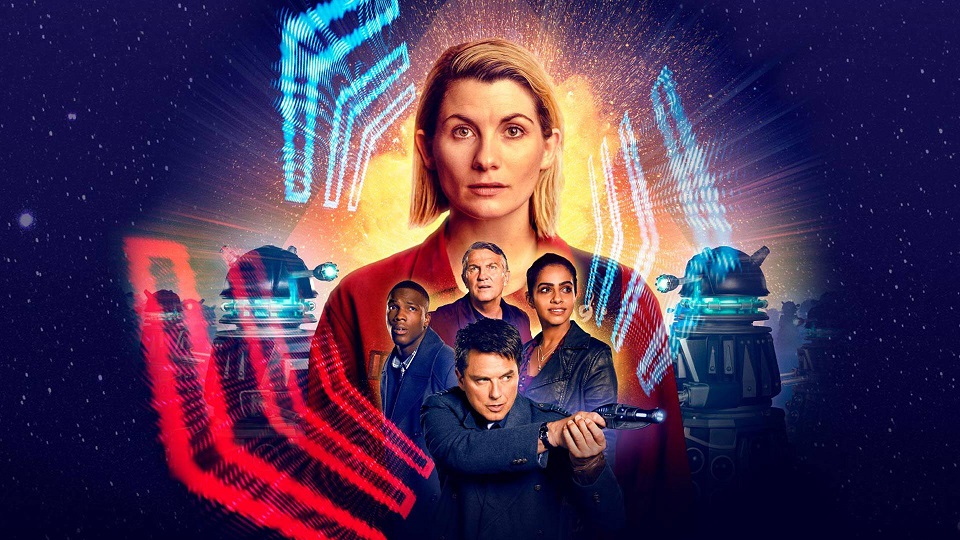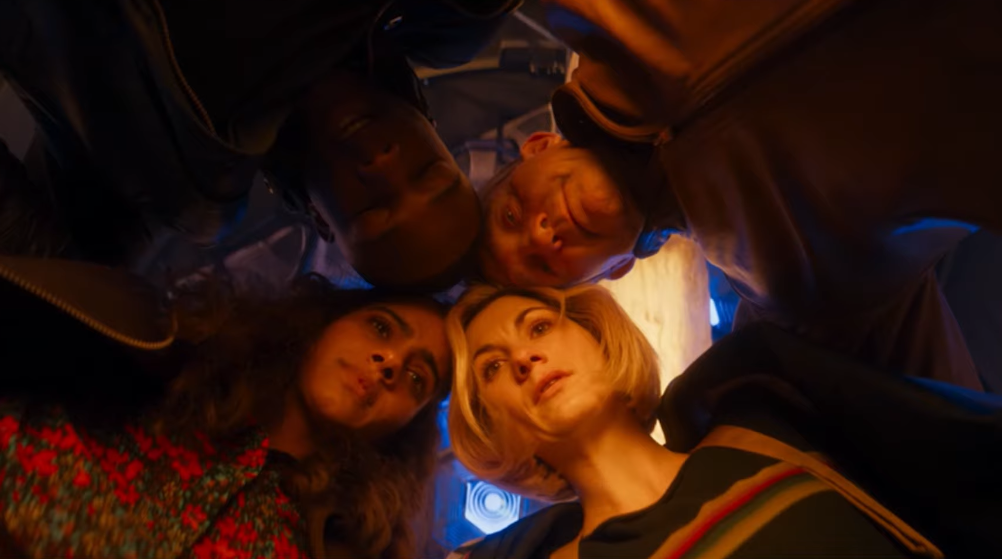By Kiyan • 15 January 2021
It’s been almost two weeks since Revolution of the Daleks aired, and one of the biggest complaints about this latest Doctor Who special that I’ve seen online since is this:
“The Doctor should have spent more of the episode imprisoned.”
Well, maybe that’s a bit disingenuous.
It’s not that the Doctor should have spent more time in Judoon prison, people are saying.
It’s that the special’s marketing — its trailers, its pre-release screenshots, etc. — all seemed to indicate that she would spend more time imprisoned than she ended up spending.
I thought so too. But then again, look at this:

See what I mean?
No?
Look closely. See Yaz? There in the center-right? She’s smiling. And she looks super happy.
And Yaz smiling and looking happy was even less a part of the episode than the Doctor’s imprisonment was.
In fact, it’s the opposite. Yaz understandably didn’t have as big a role in this episode as Ryan or Graham did, but when it was her time in the sun, she was mopey, gloomy, and likely suffering from bouts of obsession, depression, or both.
But were people crying “misleading marketing” when it came to Yaz?
Oooooooooooof course not.
Look, I like my words like I like my meat: not minced. So I’ll say it:
Yaz is the unloved stepchild of the Chris Chibnall era of Who.
It’s sad but true. And also not surprising in the slightest. Back in Series 11, Yaz was a puzzle box of a character. Who was she? We didn’t know. Sure, we knew she was a cop. Sure, we knew a little about her family and how she got along (or failed to) with each of them. Sure, we knew a bit about her values — what she thought, what she believed in.
But compared to Ryan and Graham, we didn’t quite know as much about Yaz. Not at the time.
Flash forward to early 2020 (15 years ago at time of writing). Series 12 gave us more to dig into with Yaz, revealing a bit more of her backstory and delving into what makes her tick in episodes like Can You Hear Me?
But even still, her role and her character continued to fall by the wayside, backing off, it seemed, to make room for more screentime devoted to the Doctor and the Master and, indeed, Ryan and Graham.
On that front, this latest special is no different. Ryan and Graham (and cameo appearance/fan-favorite Jack Harkness) take center stage yet again in Revolution of the Daleks, leaving Yaz with a scant few minutes’ worth of the episode devoted to her.
It’s understandable. After all, Revolution of the Daleks is Ryan and Graham’s final episode. Of course it would be dedicated in the main to them.
So despite my poking fun at people ignoring the discrepancy between the poster and the finished product, it ultimately makes sense that this small inconsistency would go unnoticed: Yaz’s emotional state understandably plays second fiddle to, well, pretty much anything else you might compare it to in the episode.
Still, even though Revolution of the Daleks has bigger fish to fry, the months Yaz’s spent obsessing over the Doctor and the unequivocally unhealthy lens through which the episode portrays her decision to stay with the Doctor are important.
They speak to the mode of storytelling we’ve been seeing on Doctor Who for the past two and a half-ish years, the mode of storytelling that sets this era of Doctor Who apart from what came before.
The Chris Chibnall era of Who has a very different feel from the RTD or Moffat eras. And that’s largely thanks to how we see characters like Yaz play out.
Once upon a time (2005-2017), Doctor Who was nothing short of a televised incendiary device. It liked to explode, putting its characters through bombastic, life-changing, outlook-shattering, horizon-broadening events each episode and packing everything it had into firecracker finales that left no grenade pin unpulled, all to the triumphant blare of Murray Gold’s unmistakable score.
In other words, Doctor Who liked to put all its chips on the table and, like a little kid too eager to tell a secret, giggle its way through the rest of the game until it got to show its hand. It kept nothing up its sleeve, played every card it had.
Plot beats, backstories, reveals: these came fast. Each episode sucker punched you and then took you on an emotional ambulance ride. Each season was synecdoche to the episodes themselves, propelling you through what felt like the entire range of human emotion, a months-long analogue to each week’s 45-minute slice. And it all culminated every year in gut-wrenching, heartrending finales the likes of which surely, you said, could never be topped.
And you were right. They couldn’t be topped. Which is why each season of New Who from 2005 to 2017 felt increasingly as if it had to outspeak, outperform, and outdo the last.
Along the way, there were a few soft resets that turned the “emotional” and “bombastic” dials back down to zero, or at least close to it. Matt Smith’s first episode for example. Capaldi’s third season.
But this was largely how things were, the modus operandi for 12 years.
No more.
New Who… New-er Who is different. When Jodie Whittaker’s Doctor fell to Earth, she brought Doctor Who right back down to Earth with her. Now, the characters are more grounded. The Bad Wolf and The Impossible Girl and The Girl Who Waited and The Last Centurion give way to a bus driver with cancer, a depressed cop, and a guy juggling dyspraxia with some serious family issues. The “greatest woman [Ryan] ever met,” Ryan explains at the end of The Woman Who Fell to Earth, isn’t who the episode leads you to believe it is at first. It’s not the Doctor; it’s Grace. This is a show, says that first episode of 13’s era, not about how amazing someone like the Doctor is, but about how “special” — that’s the word Ryan uses — an ordinary person like Grace can be.
Now, things are slower and more contemplative. There’s time now. Time to breathe and time to let words, sights, and sounds all sink in. Steven Moffat may have given Doctor Who time travel, but Chris Chibnall gave it time. What would have happened all in one season back in the day takes multiple seasons — years — in this current incarnation of Doctor Who. As of Revolution of the Daleks, the 13th Doctor still hasn’t decided what she feels about the revelations in The Timeless Children yet even after discussing it with her companions a couple times. We’re still waiting on that.
In Revolution of the Daleks, Yaz isn’t front and center. Her story, like the 13th Doctor’s, doesn’t culminate neatly in season finales or specials. Her life, like the 13th Doctor’s and like a real person’s in the real world, doesn’t change instantly thanks to single moments or simple platitudes or epic, emotional climaxes. Her story instead takes its time to grow. We’re still in the middle of it. It’ll show when it’s ready. If it’s anything like Ryan and Graham’s, it won’t end with the Doctor because (unlike how things sometimes felt with the companions of Doctor Who past) her story didn’t really start with the Doctor to begin with.
Yaz fades into the background in Revolution of the Daleks, just as she’s done since the very beginning of the 13th Doctor’s run. Who is she? Who is Yasmin Khan? We still don’t know. Not fully.
But I’m willing to bet we’ll find out.
So though New Who no longer adheres to its initial schema ― no longer winks and smiles and embarks on extravagant gambols and all-or-nothing gambles ― don’t fret and don’t despair.
And embrace the slow burn.
Two+ years in, what do you think of Yaz and the “slow burn” of current Who? Hit us up on Twitter or Facebook and let us know.
